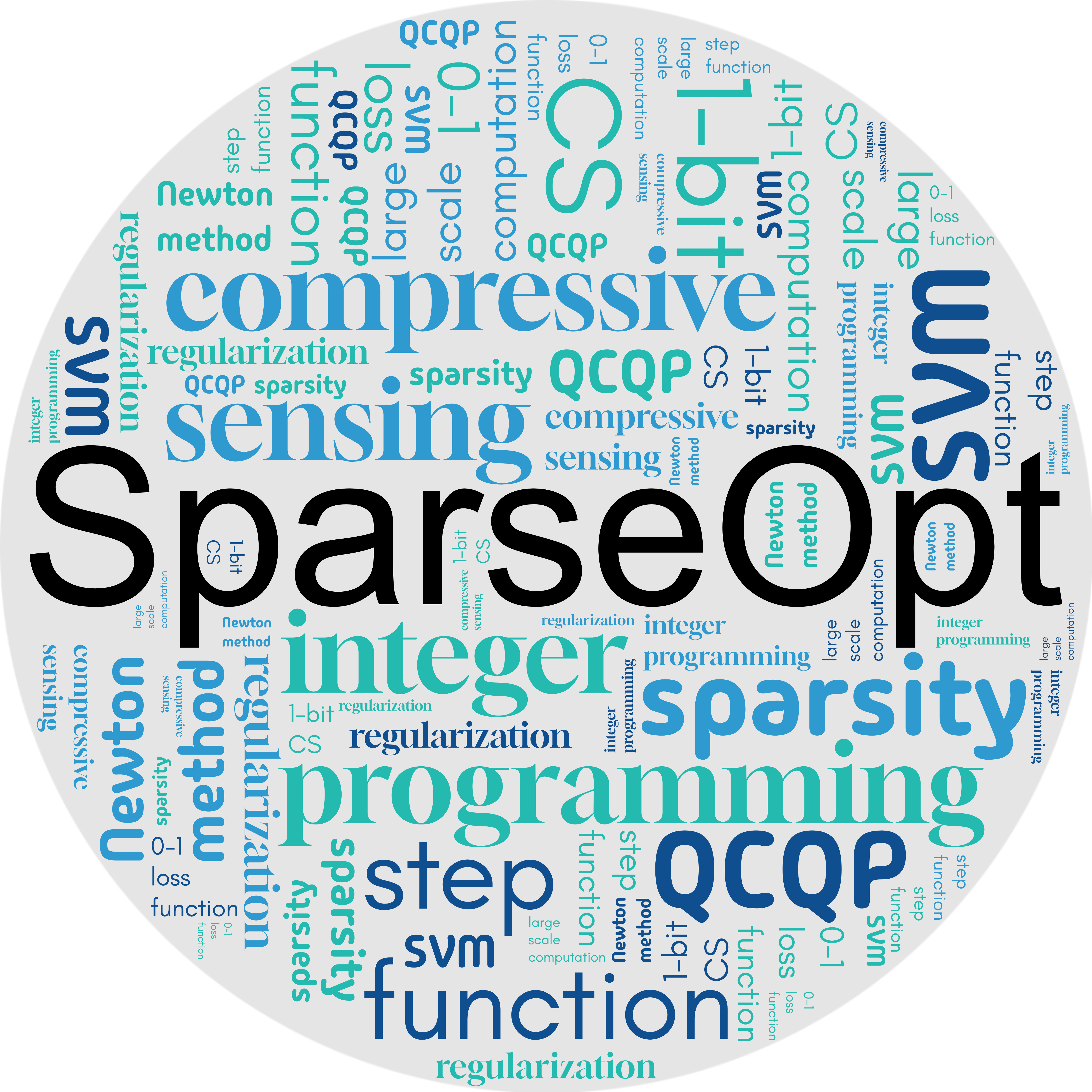Compressive sensing
\begin{equation} \mathbf{b} = \mathbf{A}\mathbf{x} + \boldsymbol{\varepsilon} \tag{CS} \end{equation}
NHTP - S Zhou, N Xiu, and H Qi, Global and quadratic convergence of Newton hard-thresholding pursuit, JMLR, 22:1-45, 2021.
GPSP - S Zhou, Gradient projection Newton pursuit for sparsity constrained optimization, ACHA, 61:75-100, 2022.
PSNP - S Zhou, X Xiu, Y Wang, and D Peng, Revisiting Lq ( 0 ≤ q < 1 ) norm regularized optimization, arXiv:2306.14394, 2023.
NL0R - S Zhou, L Pan, and N Xiu, Newton method for l0 regularized optimization, Numer Algorithms, 88:1541–1570, 2021.
IIHT - L Pan, S Zhou, N Xiu, and H Qi, A convergent iterative hard thresholding for nonnegative sparsity optimization, PJO, 13:325-353, 2017.
MIRL1 - S Zhou, N Xiu, et. al, A Null-space-based weighted l1 minimization approach to compressed sensing, Inf inference, 5:76-102, 2016.
clc; clear; close all; addpath(genpath(pwd));
n = 10000;
m = ceil(0.25*n);
s = ceil(0.05*n);
T = randperm(n,s);
xopt = zeros(n,1);
xopt(T) = (0.1+rand(s,1)).*sign(randn(s,1));
A = randn(m,n)/sqrt(m);
b = A(:,T)*xopt(T)+0.00*randn(m,1);
solver = {'GPNP', 'NHTP', 'IIHT', 'PSNP', 'NL0R', 'MIRL1'};
out = CSpack(A,[],b,n,s,solver{1});
fprintf(' Objective of xopt: %.2e\n', norm(A*xopt-b)^2/2);
fprintf(' Objective of out.sol: %.2e\n', out.obj);
fprintf(' Sparsity of out.sol: %2d\n', nnz(out.sol));
fprintf(' Computational time: %.3fsec\n',out.time);
function out = CSpack(A,At,b,n,s,solver,pars)
% -------------------------------------------------------------------------
% This solver solves compressive sensing (CS) in one of the following forms
%
% 1) The sparsity constrained compressive sensing (SCCS)
%
% min_{x\in R^n} 0.5||Ax-b||^2 s.t. ||x||_0<=s
%
% 2) The L0 regularized compressive sensing (LqCS)
%
% min_{x\in R^n} 0.5||Ax-b||^2 + lambda * ||x||_q^q, 0<=q<1
%
% 3) The reweighted L1-regularized compressive sensing (RL1CS)
%
% min_{x\in R^n} 0.5||Ax-b||^2 + lambda||Wx||_1
%
% where s << n is the given sparsity and lambda>0
% A\in\R{m by n} the measurement matrix
% b\in\R{m by 1} the observation vector
% W\in\R{n by n} is a diagonal matrix to be updated iteratively
% -------------------------------------------------------------------------
% Inputs:
% A : The measurement matrix, A\in\R{m by n} (REQUIRED)
% At : The transpose of A and can be [] if A is a matrix (REQUIRED)
% But At is REQUIRED if A is a function handle
% i.e., A*x = A(x); A'*y = At(y);
% b: The observation vector b\in\R{m by 1} (REQUIRED)
% n: Dimension of the solution x, (REQUIRED)
% s: The sparsity level, if unknown, put it as [] (REQUIRED)
% solver: A text string, can be one of (REQUIRED)
% {'NHTP','GPNP','PSNP','NL0R','IIHT','MILR1'}
%
% --------------------------------------------------------------------------------
% | 'NHTP' | 'GPNP' | 'PSNP' | 'NL0R' | 'IIHT' | 'MIRL1'
% --------------------------------------------------------------------------------
% Model | SCCS | SCCS | LqRCS | L0RCS | SCCS | RL1CS
% Method | 2nd-order | 2nd-order | 2nd-order | 2nd-order | 1st-order | 1st-order
% Sparsity | required | required | no need | no need | required | no need
% --------------------------------------------------------------------------------
%
% pars: All parameters are optional (OPTIONAL)
% ----------------For all solvers -------------------------------
% pars.x0 -- Starting point of x (default, zeros(n,1))
% pars.disp -- =1, show results for each step (default,1)
% =0, not show results for each step
% pars.maxit -- Maximum number of iterations (default, 2e3)
% pars.tol -- Tolerance of stopping criteria (default,1e-6)
% ----------------Particular for NHTP ---------------------------
% pars.eta -- A positive scalar for 'NHTP' (default, 1)
% Tuning pars.eta may improve solution quality.
% ----------------Particular for PSNP ---------------------------
% pars.q -- Decide Lq norm (default, 0.5)
% pars.lambda -- An initial penalty parameter (default, 0.1)
% pars.obj -- A predefined lower bound of f(x)(default,1e-20)
% ----------------Particular for NL0R ---------------------------
% pars.tau -- A positive scalar for 'NL0R' (default, 1)
% pars.lambda -- An initial penalty parameter (default, 0.1)
% pars.obj -- A predefined lower bound of f(x)(default,1e-20)
% ----------------Particular for IIHT ---------------------------
% pars.neg -- =0, Compute SCCS without x>=0 (default,0)
% =1, Compute SCCS with x>=0
% -------------------------------------------------------------------------
% Outputs:
% out.sol: The sparse solution x
% out.sp: Sparsity level of out.sol
% out.time: CPU time
% out.iter: Number of iterations
% out.obj: Objective function value at out.sol
% -------------------------------------------------------------------------
% Send your comments and suggestions to <<< slzhou2021@163.com >>>
% WARNING: Accuracy may not be guaranteed!!!!!
% -------------------------------------------------------------------------
